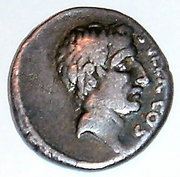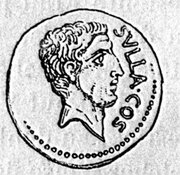Sulla
Lucius Cornelius Sulla Felix (Latin: L·CORNELIVS·L·F·P·N·SVLLA·FELIX) ¹ (ca. 138 BC–78 BC) Roman General and Dictator, was usually known simply as Sulla. His agnomen Felix — the fortunate — was attained later in his life, due to his legendary luck as a general. Sulla's name is also seen as "Silla", presumably due to corruption of ancient writing "SVILLA" (Suilla), that went in the two directions of Sulla and Silla. It is also occasionally seen as "Sylla". more...
Early years
Sulla was born into an impoverished branch of the Cornelii gens, or family, of aristocratic patrician stock but without influence in the city. Without any money, Sulla's first years were spent in the backstage of Rome's political elite. The means by which Sulla attained the fortune that enabled him to ascend to senatorial rank are not clear, although some sources refer to family inheritances.
In 107 BC, Sulla was nominated quaestor to Gaius Marius, who was taking control of the Roman army in the war against King Jugurtha of Numidia. The Jugurthine war had started in 112 BC with humiliating results for Rome. Marius' army ultimately defeated the enemy in 106 BC, thanks to Sulla's initiative to capture the Numidian king by persuading his family to betray him. The publicity attracted by this feat boosted Sulla's political career, but earned him bitter resentment from Marius. Nevertheless, Sulla continued to serve on Marius' staff until the campaign against the Germanic Teutones and Cimbri tribes in Gaul 104–103 BC. At this time, Sulla transferred to the army of Quintus Lutatius Catulus, Marius' rival consul. With Sulla's assistance, Marius and Catulus defeated the Cimbri in the Battle of Vercellae in 101 BC.
The Social War
Returning to Rome, Sulla was elected 'Praetor urbanus', through massive bribery, according to rumour. Afterwards, he was appointed to the province of Cilicia (in modern Turkey). In 92 BC Sulla left the East and returned to Rome, where he aligned himself with the opposition to Gaius Marius. On the verge of the Social War (91–88 BC), the Roman aristocracy and Senate were starting to fear Marius' ambition, which had already given him five consulships in a row from 104 BC to 100 BC. In this last rebellion of the Italian allies, Sulla served with brilliance as a general, and outshone both Marius and the consul Gnaeus Pompeius Strabo (the father of Pompey). For example, in 89 BC Sulla captured Aeclanum, the chief town of Hirpini, by setting the wooden breastwork which defended it on fire. As a result, he was elected consul for the first time in 88 BC, with Quintus Pompeius Rufus as his colleague.
In the East. The First Civil War
As the consul of Rome, Sulla prepared to depart once more for the East, in order to fight the first Mithridatic War, by the appointment of the Senate. But he would leave trouble behind him. Marius was now an old man, but he still had the ambition to lead the Roman armies against King Mithridates VI of Pontus. Marius convinced the tribune P. Sulpicius Rufus to call an assembly and revert the Senate's decision on Sulla's command. Sulpicius also used the assemblies to eject Senators from the Senate until there were not enough senators needed to form a quorum. As violence in the forum ensued and the efforts of the nobles to effect a public lynching similar to what had happenned to the brothers Gracchi and Saturninus were smashed by the gladitatorial bodyguard of Sulpicius, Sulla went to the house of Marius and made a personnel plea to stop the violence which was ignored.
Read more at Wikipedia.org




